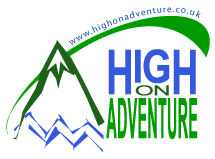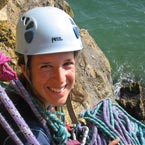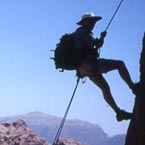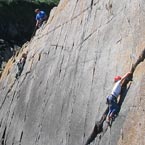Adventures on Land
The best thing to do is to use the information provided to formulate a rough idea of what you are after, then fill in the enquiry form and contact us. We will then get in touch to tailor your own programme, check availability and answer any questions.
Summer Hill Walking
There is a huge amount of enjoyment to be gained from walking and scrambling amongst the rounded hills and soaring peaks of our mountain environments. It is an activity which has huge health benefits and can become a past time which relaxes, inspires and motivates for life. Easy lowland walks provide a perfect introduction for some, whilst the more adventurous may like to challenge themselves with gaining the skills required to undertaken a remote multi day journey. Others may chose to scramble the knife edge ridges and deviously find lines up the most impenetrable of cliffs and buttresses.
Classic Walks (the Welsh 14 peaks, Munros of Scotland , the Lake District )
Guided walking in some of the most beautiful areas of the UK . Whilst we appreciate that many people want to learn new skills in order to become increasingly independent, others want to be guided for a variety of reasons. All year round courses are possible, from Welsh mountains to the Lake District and Scotland .
Introductory Navigation
The ability to relate the map to what you see, and what you see to the map! This course will aim to equip you with the basic skills of navigation. – giving grid co-ordinates, linear features, contour interpretation, route selection, use of tick-off features, hand-railing and bearings.
Intermediate Navigation
This course will build on the basic skills and go onto look at more advanced techniques which aid safe travel when conditions of poor visibility exist such as timing and pacing, aiming-off, and attack points.
Advanced Navigation
This will put all the skills taught on the intermediate course to the test, as well as including the introduction of back bearings and establishing slope aspect. It is likely that this course will make use of the hours of dusk / darkness to recreate an environment of poor visibility, where skills can be taught and tested.
Global Positioning Systems
We believe that over reliance on GPS technology without an ability to navigate using traditional techniques (map and compass) is likely to lead to incidents. However, we appreciate that these tools do play an ever increasing important role as their use becomes more widespread. This course will look at the capabilities of such devices and in certain circumstances highlight their limitations.
Emergency Ropework
We all make navigational errors, some more frequently than others. At times such mistakes can lead us into areas where we encounter steeper terrain than anticipated. A rope can be a useful to safeguard you andother peoples’passage over a short section of steep ground. It is also possible to use the rope to provide a degree of confidence to those people who feel nervous on the terrain encountered. Short carries of injured parties are also possible when using the rope as a stretcher.
Multi Day Journeys
To journey for a number of days, carrying tent, stove and all your food requirements enables you to experience the mountains in all their moods – stunning sunsets, starry skies, shooting stars and early morning sunrises, plus the enjoyment and fulfilment of getting ‘away from it all’. Route planning, food requirements andbasic camp craft can be introduced. The duration of this activity is very flexible.
Introductory Scrambling
For those of you who wish to experience steeper terrain a course involving scrambling could be for you. This course will introduce movement skills over steeper terrain, where the use of hands to aid your ascent can be expected, where careful route selection is crucial, and the occasional use of the rope to safeguard your ascent may be needed.
Intermediate Scrambling
The terrain involved here will necessitate the use of basic rope techniques in order to safeguard the ascent. These skills will be developed alongside route choice, anchor selection and appropriate runner placements.
Advanced Scrambling
Defining the upper limit of scrambling is tricky, as routes start to feel more like rock climbs than scrambles – belays are frequent, the consequences of falling if unroped would be exceptionally serious, the moves are difficult and require dry rock and route finding is often complex. Bearing all of this in mind, the skills required include excellent route choice, anchor selection, choosing belays and belaying and an ability to abseil retreat if it all gets too much! We will explore all off these techniques on easier scrambles before putting into practice to ascend some of the best scrambles out there.
Winter Hill Walking
It is hoped that winter conditions will still be found in the mountains for many years to come, though there can be no doubt that climatic change is shortening the season when such conditions can be found. One thing that is likely to increase is the frequency of harsh uncharacteristic weather events. For those that have experienced the mountains of Scotland in full winter conditions, no more beautiful place can be found. Snow cover presents a hazard in itself and skills are needed to travel safely when such conditions exist. Courses can range from basic winter skills involving crampon and axe techniques, winter navigation and avalanche assessment through to more advanced techniques dealing with steeper terrain, pitching and belay construction
Winter Walks
It has been suggested that in Scotland during winter, hill walking does not exist and all adventures would be defined far more accurately as mountaineering. This course will teach the skills required for safe travel over non complex snowy terrain, walking with crampons and ice-axe and appropriate methods to arrest a falls.
Winter Skills
This course will look to develop skills specific to safe travel in the winter environment. Developing crampon and axe skills further, terrain considerations with relation to avalanche danger, snow pack assessment and the construction of emergency snow shelters could all form part of the course and is dependent on previous experience.
Winter Navigation Techniques
Navigating in full winter conditions is the most testing environment of all. Asimple mistake can have very serious results if not recognised and corrected. Previous navigation experience is a necessity. Time will be spent looking at contour interpretation and slope aspect, plus covering strategies to cope with white out conditions.
Emergency Ropework
We all make navigational errors, some more frequently than others. At times such mistakes can lead us into areas where we encounter steeper terrain than anticipated. A rope can be a useful to safeguard you and other peoples’ passage over a short section of steep ground. It is also possible to use the rope to provide a degree of confidence to those people who feel nervous on the terrain encountered. Short carries of injured parties are also possible when using the rope as a stretcher. Finding anchors in snow covered terrain needs specific training into the methods of constructing belays.
Customer Feedback
»





![View our e-flyer? [.PDF] View our e-flyer? [.PDF]](images/pdf_flyer.gif)
